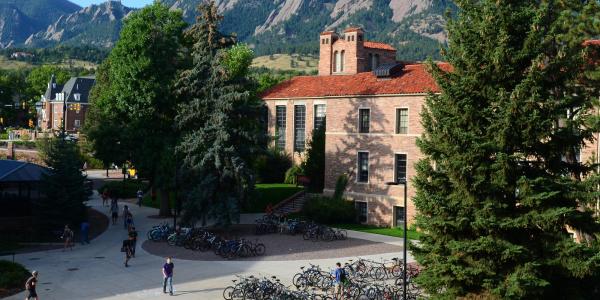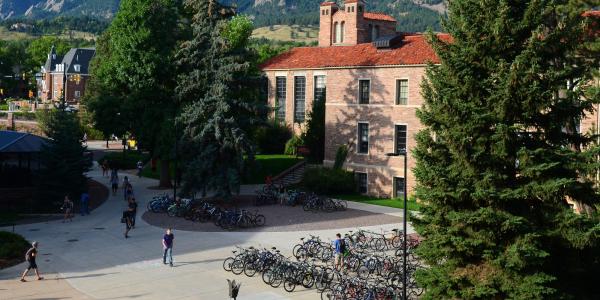Patrick O’Rourke, interim executive vice chancellor and chief operating officer, and Frances Draper, senior strategic advisor for government and community engagement, presented Boulder City Council members with updates from the university’s Road Map to Fall 2020 plan at a city council study session on Tuesday, July 14.
Council members asked for more information about COVID-19 testing on and off campus, how infected students would be quarantined, and how the university would convince students that they are living in an “extraordinary time and the behavior that is needed” as Colorado and the nation face the ongoing challenges of a global pandemic.
Draper described the university’s preparations for fall 2020 as a balance of trying to keep the community safe while meeting the mission of higher education for the state.
“We want to do the finest job we can with the brains that we have behind this and help keep the state and our community competitive (while providing) a bright future for our young people,” she said.
Council members asked how the university would ensure that students living on and off campus would be in compliance with the campus’s new COVID-ready operational model.
O’Rourke told them that the campus would work to reduce potentially infectious contacts among students, faculty and staff by decreasing the density of people in residence halls, classrooms and buildings and by implementing social distancing and other physical measures—such as the use of plexiglass where distancing is a challenge, requiring masks, and increased cleaning and sanitation protocols—among other safety strategies.
Epidemiologists, he said, have told university planners that the risk of infection increases with the number of contacts students have outside of classrooms and campus buildings, which is why the university’s cohort model for first-year students is an important element to helping limit exposures to infection by reducing their campus footprint.
“What we are really trying to do is prevent the number of times that you mix the deck, and that’s why there would be different cohorts and that those people would largely take their classes together rather than being interspersed,” O’Rourke said.
Rachel Friend and other council members asked how the university planned to monitor, test and quarantine students living off campus, and O’Rourke said the university would require all students coming into residence halls to get tested “because we have the ability to check them in.” Recognizing that it may not be possible for some students to get tested in advance, the campus is preparing to provide a limited number of RT-PCR and rapid-response tests on campus for residence hall students before they check in as part of an array of testing options.
Draper told city council members that campus researchers are “working feverishly” to expand the university’s testing capabilities, including the development of a saliva test that could potentially be used to rapidly screen people on campus and off campus.
For his part, Mayor Sam Weaver asked O’Rourke and Draper about the message that would be given to students about 2020 being “an extraordinary time and the behaviors that are needed” to stem COVID-19, especially among students who want to meet new people and engage in traditional social activities for college students.
“We have to start with training,” O’Rourke said. “We then also have to continually reinforce the message.”
This fall, every student will have to take a COVID-19 education module as a condition of enrollment, said O’Rourke, who also mentioned that CU Student Government (CUSG) student leaders will serve as liaisons who will remind students of the necessity of engaging in behavior such as social distancing, good hygiene and mask wearing.
O’Rourke also noted the modifications the university made to the student code of conduct to make students aware there will be consequences to their behavior, both on and off campus, and that the ability for faculty, staff and students to return to campus and keep students on campus to pursue their studies depends on students’ ability to meet expectations.
CUSG leaders are developing a campaign directed toward students and would like to meet with the city council to discuss their plan, Draper told city leaders, and Mayor Weaver welcomed the idea, noting that hearing what student government leaders think is the best way to manage interaction between students and the rest of the community.
Council member Bob Yates suggested that bringing peer-to-peer student ambassadors to Pearl Street and the Hill—similar to a program conducted by the Downtown Boulder Partnership—could be very effective and appreciated by community members and business owners. Draper said CU’s Office of Off Campus Housing and Neighborhood Relations has a student ambassador program, and offered to bring Yates’ suggestion forward to the campus.



